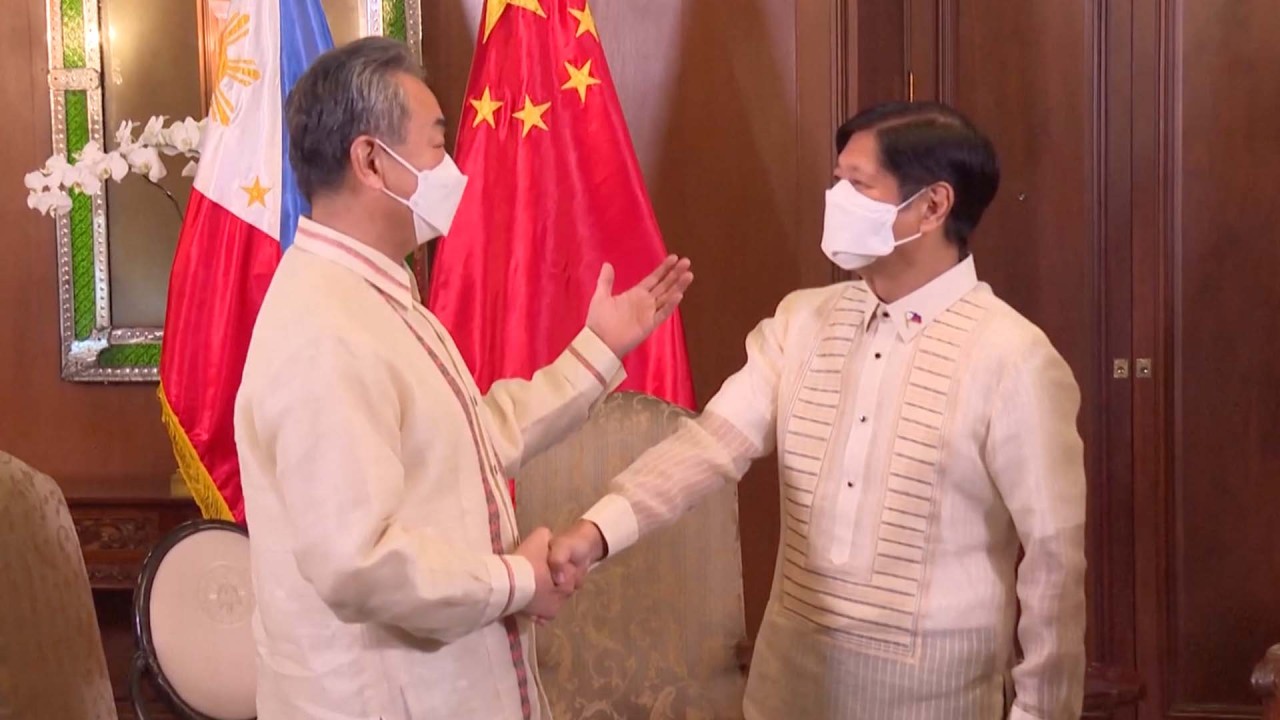
Philippines’ bid to deepen China ties not likely to raise alarm bells in US: analysts
- With US-Philippine ties back on track, analysts say Washington will not expect Marcos Jnr to make major policy moves similar to Duterte’s pronouncement back in 2016
- Elevating ties to ‘comprehensive strategic partnership’ could benefit Manila and make it a partner instead of adversary to China, one observer notes
On the eve of Marcos’ three-day trip, Beijing suggested to Manila that both countries elevate their current relationship status from a “strategic cooperation” to a “comprehensive strategic partnership”, a source close to the government said on Monday, although there were “pro-US elements in government opposed to it”.
Before flying to Beijing on Tuesday, Marcos Jnr said, “I leave for Beijing. I will be opening a new chapter in our comprehensive strategic cooperation with China.”
Marcos heads to Beijing with trade, investment and maritime issues on his mind
Renato DeCastro, a professor of International Studies at De la Salle University, said with US-Philippine ties back on track after Marcos Jnr’s two meetings with US President Joe Biden, Washington was unlikely to react negatively to the Philippine leader deepening his ties with Beijing.
“They (the Americans) don’t expect any dramatic pronouncement to be made by Marcos Jnr similar to what [predecessor Rodrigo] Duterte made in 2016 because the improved relations with the US have made the US very comfortable with this administration,” he said.
Marcos Jnr had previously assured Biden that “we are your partners. We are your allies. We are your friends”.
With Washington observing the China visit, however, Marcos Jnr “is torn between two lovers [and] has to make a hard decision during and after the official visit”, said Chester Cabalza, president and founder of Manila-based think tank International Development and Security Cooperation.
Marcos Jnr “cannot afford to be friends to all”, Cabalza added, warning that the Philippines was caught between two rival powers and could be affected by security anxieties and conflicts should it continue with its balancing act.
“Marcos must decide on the direction of his evolving foreign policy. He must take a risk and make a bold move to advance the national interest of the Philippines,” Cabalza said.

The visit has been characterised by both China and the Philippines as an opportunity to “usher in a new ‘golden age’ in bilateral friendship”, build on growing trade and investment ties, and address security issues of mutual concern.
China appears to be wooing Marcos Jnr more ardently than it did Duterte, with possible grants amounting to 1.5 billion yuan (US$217.4 million) on the cards. In contrast, after Duterte had publicly announced “my separation from the United States” during his Beijing state visit in 2016, he came home with only US$97.27 million in grants.
DeCastro gave two possible explanations for this.
Second, Duterte’s open declaration “made him weaker” as he had already shown his hand, but Marcos Jnr “is keeping his cards close to his chest like his dad. He knows how his dad played the game in the 1970s”. Marcos Jnr’s late dictator-father opened diplomatic relations with China in 1975.
Elevating relations with China to that of a “comprehensive strategic partnership” (CSP) would also not bother the US, depending on the wording and scope of the agreement, DeCastro said.
He called the CSP a “Chinese invention” which is not yet part of the international diplomacy lexicon. “It’s basically a Chinese term – they coined it.”
Vietnamese scholar Hoang Thi Ha’s 2021 study on Chinese “partnerships” noted the CSP term referred to an alliance between states that convey a sense of trust, mutual value and alignment of goals, and willingness to strengthen ties.
According to Hoang, there are “different levels in China’s partnership system, corresponding to the importance that Beijing attaches to each partner” and the CSP is considered the “second-highest level of bilateral ties, above ‘strategic partnership’ and below ‘comprehensive strategic cooperative partnership’”.
Chinese Premier Wen Jiabao had in 2004 said that “a ‘partnership’ means equal-footed, mutually beneficial and win-win cooperation”.

DeCastro also said Beijing’s proposed “hotline” to Manila linking both countries’ foreign ministries – meant to “avoid miscalculation and miscommunication in the West Philippine Sea” – was not an issue for the US.
Security expert Rommel Banlaoi, chairman of the Philippine Institute for Peace, Violence and Terrorism Research think tank in Manila, urged Marcos Jnr to elevate ties with China to a CSP.
Banlaoi had previously said the CSP would ensure “China will be compelled to be more conscious of our interest and regard our interest as its interest also … We will be partners, not adversaries”.
Whatever Marcos’ rhetoric, it suits Manila to be friendly with China
Cabalza disagreed. “Imagine the Philippines, a (defence) treaty ally of the US, [becoming] the new best friend of China? If it happens, the second pivot to China under Marcos Jnr would be a nightmare for the US. It would be a great slap for Washington and its allies,” he said.
With the US and China in competition for influence in the region, Cabalza said the Philippines was “an asset that both powers need to possess and ally with”.
“But Washington is confident that Marcos Jnr will discern well and think of the future of the Philippines,” he added.


